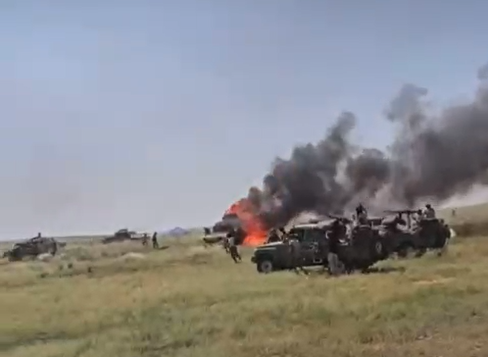Large deployment of RSF troops in West Darfur after Joint Force seizes Kulbus

Screenshot from footage of the battle in Mount Awum in West Darfur between the RSF and the Joint Force on Monday (Photo: Sudanese Joint Force via X)
Areas north of El Geneina, the capital of West Darfur, are witnessing a large deployment of Rapid Support Forces (RSF), following battles between the Sudanese Joint Force and the RSF in Jebel Awun in Kulbus on Monday and Tuesday.
Journalist Alaaeddin Babiker, rapporteur of the West Darfur Emergency Room, told Radio Dabanga yesterday that the RSF are trying to enter Kulbus in northern West Darfur after the Sudanese Joint Force*, made up of fighters of the Darfur Joint Protection Force, enforced with new recruits, took control of the area.
He reported that the localities of Sirba and Jebel Moon, between El Geneina and Kulbus, are witnessing a large deployment of RSF paramilitaries.
On Monday, the Sudanese Joint Force as the Joint Force of Armed Struggle Movements is now also called, claimed control over Jebel Awum, which lies between the towns of Kulbus and Selea along the border with Chad.
Basha Tabig, advisor to the RSF commander, however, responded that the RSF paramilitaries were able to repel the Joint Force combatants in the area.
Mohamed Idris, media coordinator for the Civilian Authority, formed by the RSF in West Darfur, after they took control of El Geneina in November last year, on Tuesday acknowledged the Joint Force’s control over Kulbus – where many people who fled the extremely fierce attacks on the Masalit in El Geneina and surroundings have sought refuge.
He confirmed RSF’s control ove Jebel Awum and explained that this area previously was used as a base by rebel movements base. “There are no residents in Jebel Awun and if displacement did occur, it is caused by rebel fighters who entered Kulbus locality and terrorised the people there after they attacked Awum.”
Idris added that “the RSF are not hostile to civilians, only against those who attack them and raise weapons against them” and referred to the formation of a special “RSF force to protect civilians in areas under their control and secure the work of humanitarian aid organisations in coordination with the Sudanese Agency for Relief and Humanitarian Operations”.
‘Diversionary tactic’
Asked about the situation in the West Darfur capital, about 100 kilometres from Kulbus, journalist and rapporteur Babiker said that “life is calm in in the city”.
Traffic between El Geneina and nearby towns in Chad is ongoing “because the people’s interests here are linked with Chad. The Chadian franc even has become the main currency used in El Geneina.”
He noted that the battles for Jebel Awun caused the remaining people here to question whether the violence would reach El Geneina again”.
People also wonder about the nature of the forces that entered Kulbus and Jebel Awum area where they clashed with the RSF this week, he said. “Some say they come from Libya. Yet others think they came from North Darfur. Many observers say that the attacks on West Darfur areas are not meant to seize El Geneina but are a diversionary tactic to alleviate the pressure on the besieged city of El Fasher.”
According to Sudan War Monitor, Joint Force reinforcements arrived in North Darfur, following mass mobilisation in the state, neighbouring Chad, and eastern parts of Sudan.
Maj Ahmed Hussein, spokesperson for the Joint Force, told Radio Dabanga on Wednesday that its leadership has “designed a precise plan to cut off the supply lines and paths of the RSF”. The Joint Forcetook control of the Sudanese-Libyan-Chadian border triangle three months ago as a first stage, and seized the area north of Kutum in North Darfur earlier this week.
Displaced
Hundreds of families living in Kulbus have fled to to Jebel Moon or crossed the border to Chad.
About 800 families were displaced from Jebel Awum in Kulbus and about 1,405 families fled from Seleia in Jebel Moon following the heavy fighting between the Joint Force and the RSF on Monday and Tuesday.
Chadians in Baraka told Radio Dabanga that hundreds of families crossed the border.
* The Darfur Joint Force was formed in June 2022, as agreed on in the 2020 Juba Peace Agreement (JPA), to protect the people in the region. The force was made up of fighters of the Sudan Liberation Movement faction headed by Darfur Governor Minni Minawi (SLM-MM), the JEM faction led by Finance Minister Gibril Ibrahim (JEM-GI), and several small rebel groups that signed the JPA. These movements renounced their neutrality in November last year and are now fighting the RSF alongside the Sudanese army. Since then, Sudanese media speak about the Joint Force of Armed Struggle Movements, while the group’s logo on their X and Facebook accounts says Sudanese Joint Force (and in Arabic Sudanese Joint Forces).











 and then
and then